The English Legal Documents
2006-19年专四虚拟语气真题汇总

2006——2019年专四虚拟语气真题汇总1.______the attempted rescue mission, the hostages might still be alive. (2019年)A.If it not had been forB.If had it not been forC.Had it not been forD.Had not it been for2.My mother was determined to help those in need and she would have been immensely proud of what has been achieved these last 20 years. The italicized part in the sentence expresses_______. (2018年)A.a hypothesisB.a suggestionC.a contradictionD.a surprise3.“If I were you, I wouldn’t wait to propose to her.” The subjunctive mood in the sentence is used to_____. (2017年)A.Alleviate hostilityB.Express unfavorable feelingsC.Indicate uncertaintyD.Make a suggestion4._______your advice, I would have made the wrong decision. (2016年)A.Hadn’t it been forB.Had it not been forC.Had it been forD.Had not it been for5.The sentence I wish I had been more careful in spending money expresses the speaker’s ____.A.HopeB. JoyC. regret D relief6.If you explained the situation to your lawyer, he___ able to advise you much better than I can.A.will beB. would beC. wasD. were7.It is essential that he ____all the facts first.A.Is examiningB. will examineC. examinesD. examine8.Which of the following sentences contains subjunctive mood?A.Lucy insisted that her son get home before 5 o’clock.B.She used to drive to work, but now she takes the city metro.C.Walk straight ahead, don’t turn till the second traffic lights.D.Paul will cancel his flight if he cannot get his visa by Friday.9.My boss ordered that the legal documents___ to him before lunch.A.be sent B were sent C were to be sent D must be sent10.It is necessary that he___the assignment without delay.A.hand inB. hands inC. must hand inD. has to hand in11.If there were not subjunctive mood, English___much easier to learn.A.could have been B would be C will be D would have been12.If only the patient_____ a different treatment instead of using the antibiotics, he might still be alive now.A had receivedB receivedC should receiveD were receiving13.If only I_____ play the guitar as well as you!A wouldB couldC shouldD might14.It’s high time we____ cutting down the rainforests.A.Stopped B had to stop C shall stop D stop15.It is imperative that the government______more investment into the shipbuilding industry. (2006年真题)A attractsB shall attractC attractD has to attract16.。
法律英语lec考试真题及解析
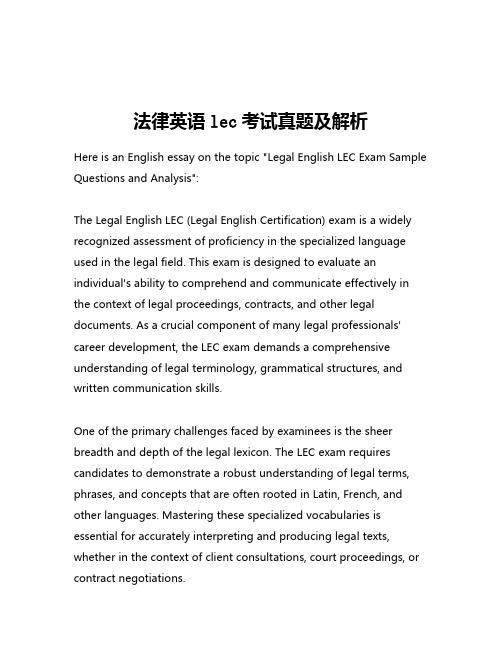
法律英语lec考试真题及解析Here is an English essay on the topic "Legal English LEC Exam Sample Questions and Analysis":The Legal English LEC (Legal English Certification) exam is a widely recognized assessment of proficiency in the specialized language used in the legal field. This exam is designed to evaluate an individual's ability to comprehend and communicate effectively in the context of legal proceedings, contracts, and other legal documents. As a crucial component of many legal professionals' career development, the LEC exam demands a comprehensive understanding of legal terminology, grammatical structures, and written communication skills.One of the primary challenges faced by examinees is the sheer breadth and depth of the legal lexicon. The LEC exam requires candidates to demonstrate a robust understanding of legal terms, phrases, and concepts that are often rooted in Latin, French, and other languages. Mastering these specialized vocabularies is essential for accurately interpreting and producing legal texts, whether in the context of client consultations, court proceedings, or contract negotiations.In addition to lexical knowledge, the LEC exam also assesses an individual's command of legal grammar and syntax. Legal writing often follows a distinct stylistic convention, characterized by the use of passive voice, complex sentence structures, and formal language. Successful candidates must be able to navigate these linguistic nuances and produce clear, concise, and unambiguous written responses.Another crucial aspect of the LEC exam is the ability to comprehend and analyze legal documents, such as case law, statutes, and regulatory frameworks. Examinees are often presented with excerpts from these sources and asked to demonstrate their understanding of the underlying legal principles, the implications of specific provisions, and the overall context of the document.To effectively prepare for the LEC exam, aspiring legal professionals must engage in a comprehensive and structured study regimen. This may include reviewing sample exam questions, practicing legal writing exercises, and immersing oneself in the language and conventions of the legal field through extensive reading and research.One effective study strategy is to familiarize oneself with common LEC exam question formats and the associated skills required for each. For instance, some questions may focus on vocabularyrecognition, where examinees must select the appropriate legal term to complete a sentence or define a specific concept. Other questions may test an individual's ability to identify and correct grammatical errors in legal texts or to rephrase legal statements in a more concise and clear manner.Additionally, examinees should be prepared to demonstrate their ability to analyze and interpret legal documents. This may involve summarizing the key points of a case law excerpt, identifying the underlying legal principles at play, or evaluating the potential implications of a specific statutory provision.By mastering these diverse skills and strategies, aspiring legal professionals can increase their chances of success on the LEC exam and further enhance their career prospects within the legal industry. The LEC certification serves as a valuable credential, demonstrating an individual's mastery of the specialized language and communication skills required for effective legal practice.In conclusion, the LEC exam is a rigorous assessment of an individual's proficiency in legal English, encompassing a wide range of linguistic and analytical skills. Successful preparation for this exam requires a comprehensive and dedicated approach, involving the study of legal terminology, grammatical conventions, and the interpretation of various legal documents. By investing the time andeffort to excel on the LEC exam, aspiring legal professionals can unlock new opportunities and strengthen their positioning within the competitive legal landscape.。
法律文书 英文
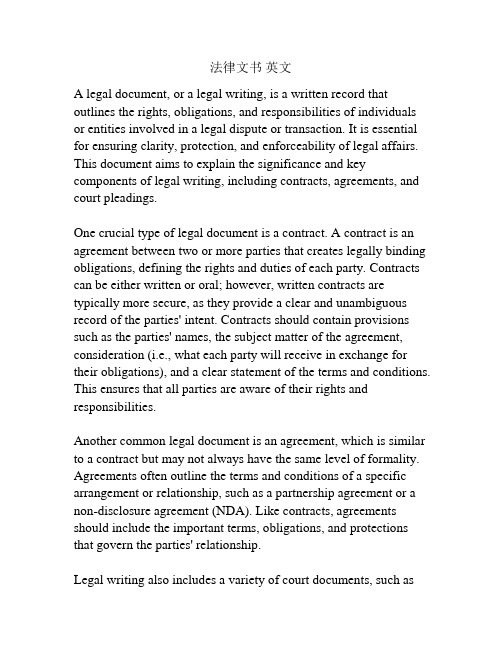
法律文书英文A legal document, or a legal writing, is a written record that outlines the rights, obligations, and responsibilities of individuals or entities involved in a legal dispute or transaction. It is essential for ensuring clarity, protection, and enforceability of legal affairs. This document aims to explain the significance and key components of legal writing, including contracts, agreements, and court pleadings.One crucial type of legal document is a contract. A contract is an agreement between two or more parties that creates legally binding obligations, defining the rights and duties of each party. Contracts can be either written or oral; however, written contracts are typically more secure, as they provide a clear and unambiguous record of the parties' intent. Contracts should contain provisions such as the parties' names, the subject matter of the agreement, consideration (i.e., what each party will receive in exchange for their obligations), and a clear statement of the terms and conditions. This ensures that all parties are aware of their rights and responsibilities.Another common legal document is an agreement, which is similar to a contract but may not always have the same level of formality. Agreements often outline the terms and conditions of a specific arrangement or relationship, such as a partnership agreement or a non-disclosure agreement (NDA). Like contracts, agreements should include the important terms, obligations, and protections that govern the parties' relationship.Legal writing also includes a variety of court documents, such aspleadings and motions. These documents are submitted to a court to initiate a legal action or request a specific ruling. Pleadings, which include complaints and answers, lay out the respective claims and defenses of each party. Motions, on the other hand, are written requests to the court for specific relief or rulings. These documents must follow specific formatting and procedural rules set by the court to ensure uniformity and fairness in the legal process.In addition to contracts, agreements, and court pleadings, legal writing may also include documents such as wills, trusts, and powers of attorney. These documents outline individuals' wishes and instructions in the event of their incapacitation or death.To create effective legal writing, it is important to be precise, clear, and concise. Legal documents should use plain language whenever possible, avoiding technical jargon that may confuse or mislead the parties involved. Moreover, legal writing must be meticulously crafted to ensure accuracy and avoid ambiguity, as any misinterpretation may lead to legal disputes or challenges.In conclusion, legal writing plays a critical role in legal affairs. Whether it is a contract, an agreement, or court pleadings, these documents outline rights, obligations, and responsibilities, establishing a framework for legal actions and transactions. Drafting these documents requires careful attention to detail, clarity, and precision to ensure the enforceability and protection of all parties involved.。
法务英语要求

法务英语要求Legal English is a specialized form of language that is used in the field of law. It is important for lawyers, legal professionals, and anyone involved in the legal industry to have a good understanding of legal English in order to effectively communicate and interpret legal documents. Legal English has its own vocabulary, grammar rules, and syntax that are specific to the legal profession. Understanding legal English is crucial for lawyers to be able to draft legal documents, communicate with clients and colleagues, appear in court, and analyze and interpret complex legal texts.法务英语是一种专门用于法律领域的语言。
对于律师、法律专业人士和任何涉及法律行业的人来说,了解法务英语很重要,以便有效地沟通和解释法律文件。
法务英语有其自己的词汇、语法规则和句法,这些都是法律行业特有的。
了解法务英语对于律师能够起草法律文件、与客户和同事沟通、出庭以及分析和解释复杂的法律文本是至关重要的。
Legal English involves the use of precise language and terminology to convey legal concepts accurately and clearly. It requires a high level of attention to detail and precision in order to avoid ambiguity and misinterpretation. Legal documents, such as contracts, pleadings,and briefs, must be drafted with care to ensure that the language used accurately reflects the intended meaning and legal implications. The use of incorrect or imprecise language in legal documents can have serious consequences and may result in legal disputes or misunderstandings between parties.法务英语涉及使用精确的语言和术语准确清晰地传达法律概念。
英语专四2012年真题

[A] How strange feelings they are!
[B] How dare you speak to me like that!
[C] What noise they are making!
[D] What a mess we are in!
17. Which of the italicized parts functions as a subject?
[C] Classification of lies in marriage.
[D] Advice on a successful marriage.
2. [A] We intentionally do so.
[B] No one tells us how to live in truth.
[C] We are afraid to lose the one we love.
last reading will be done at normal speed again and during this time you should check your work. You will then
be given 1 minute to check through your work once more.
about what was said. Both the conversations and the questions will be spoken ONCE ONLY. After each question there will be a ten-second pause. During the pause, you should read the four choices of [A], [B], [C] and [D], and mark the best answer to each question on ANSWER SHEET TWO.
法律翻译句式特点

5)WHEREAS the Licensee desires to design, manufacture, sell and export … by using Licensor’s knowhow. 鉴于受让方愿意使用许可方的专有技术进 行设计、生产、销售以及出口… …
▲ OTHERWISE ▲ SUBJECT TO ▲ WITHOUT PREJUDICE TO ▲ WHERE ▲ ANY PERSON WHO DOES... SHALL ... ▲ FOR THE PURPOSE(S) OF ... ▲ "PROVIDED THAT ..." ▲ NOTWITHSTANDING ... ▲ SAVE.../ EXCEPT (FOR)... ▲ IN RESPECT OF…
(二) SUBJECT TO
该短语在法律英文中一般都跟 “agreement‖, ―section‖, ―contract‖等 法律文件名或文件中特定条款名配合使用。 通常可翻译成“以……为条件”、“根 据……规定”、“ 在符合………的情况下”、 “除……另有规定外”以及“在不抵触…… 下”等。
例6
分析: Unless the context otherwise requires…(除……另有……外) 被动—unless in any enactment it is otherwise provided,…(除成文法另有规 定外)
例3 Any person who by threats, persuasion or otherwise induces a witness or a party not to give evidence in any hearing before the Board commits an offence. 任何人籍恐吓﹑怂恿或以其它手段诱使证人或一 方当事人不在仲裁处聆讯中作证﹐即属犯罪。
如何学好法律英语
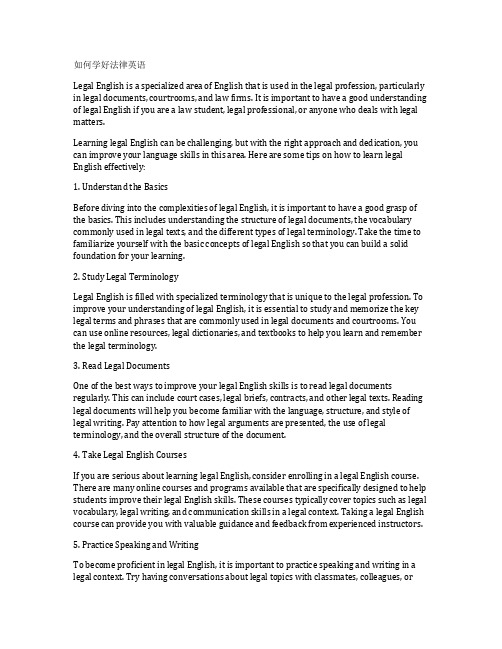
如何学好法律英语Legal English is a specialized area of English that is used in the legal profession, particularly in legal documents, courtrooms, and law firms. It is important to have a good understanding of legal English if you are a law student, legal professional, or anyone who deals with legal matters.Learning legal English can be challenging, but with the right approach and dedication, you can improve your language skills in this area. Here are some tips on how to learn legal English effectively:1. Understand the BasicsBefore diving into the complexities of legal English, it is important to have a good grasp of the basics. This includes understanding the structure of legal documents, the vocabulary commonly used in legal texts, and the different types of legal terminology. Take the time to familiarize yourself with the basic concepts of legal English so that you can build a solid foundation for your learning.2. Study Legal TerminologyLegal English is filled with specialized terminology that is unique to the legal profession. To improve your understanding of legal English, it is essential to study and memorize the key legal terms and phrases that are commonly used in legal documents and courtrooms. You can use online resources, legal dictionaries, and textbooks to help you learn and remember the legal terminology.3. Read Legal DocumentsOne of the best ways to improve your legal English skills is to read legal documents regularly. This can include court cases, legal briefs, contracts, and other legal texts. Reading legal documents will help you become familiar with the language, structure, and style of legal writing. Pay attention to how legal arguments are presented, the use of legal terminology, and the overall structure of the document.4. Take Legal English CoursesIf you are serious about learning legal English, consider enrolling in a legal English course. There are many online courses and programs available that are specifically designed to help students improve their legal English skills. These courses typically cover topics such as legal vocabulary, legal writing, and communication skills in a legal context. Taking a legal English course can provide you with valuable guidance and feedback from experienced instructors.5. Practice Speaking and WritingTo become proficient in legal English, it is important to practice speaking and writing in a legal context. Try having conversations about legal topics with classmates, colleagues, orfriends who are also interested in the law. Additionally, practice writing legal documents, such as legal letters, legal memos, and briefs. This will help you become more comfortable with using legal English in a practical setting.6. Watch Legal TV Shows and MoviesWatching legal TV shows and movies can be a fun and effective way to improve your legal English skills. Pay attention to how legal professionals communicate, argue, and present their cases in court. This can help you learn more about the language and style of legal English in a real-world context. Some popular legal TV shows and movies to consider watching include "The Good Wife," "Law & Order," and "A Few Good Men."7. Join Legal English Study GroupsConsider joining a legal English study group or discussion forum where you can connect with other students and legal professionals who are also interested in improving their legal English skills. Study groups can provide you with a supportive environment to practice speaking, ask questions, and share resources. Additionally, discussing legal topics with others can help you gain different perspectives and insights on legal issues.8. Use Legal English ResourcesThere are many resources available to help you learn legal English, such as legal dictionaries, online glossaries, and legal writing guides. Take advantage of these resources to expand your knowledge of legal terminology and improve your legal writing skills. Additionally, consider using legal English textbooks and reference materials to deepen your understanding of legal concepts and principles.9. Stay Updated on Legal NewsTo stay current with legal trends and developments, make an effort to follow legal news and updates. This can include reading legal blogs, subscribing to legal newsletters, and following legal organizations on social media. By staying informed on legal news, you can expand your knowledge of legal issues and enhance your understanding of legal English in a real-world context.10. Practice RegularlyLearning legal English is a continuous process that requires regular practice and dedication. Make an effort to practice your language skills every day by reading legal texts, writing legal documents, and engaging in legal discussions. The more you practice, the more confident and proficient you will become in using legal English.In conclusion, learning legal English can be a challenging but rewarding journey. By following these tips and strategies, you can improve your legal English skills and enhance your understanding of legal terminology, writing, and communication. Remember to staypatient and persistent in your learning efforts, and you will soon become proficient in legal English.。
法律与法规英语词汇大全
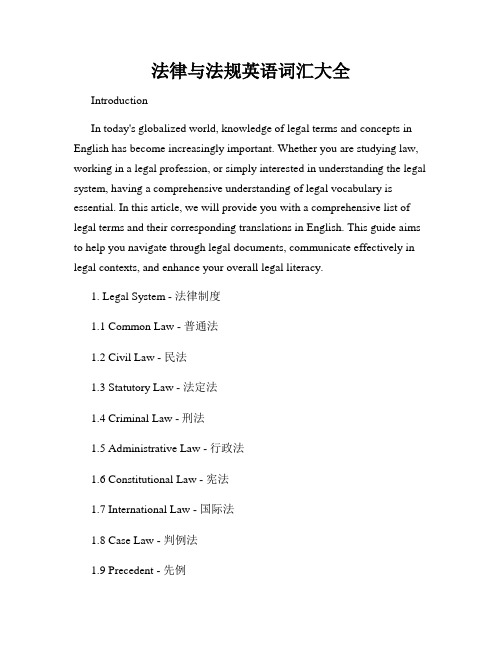
法律与法规英语词汇大全IntroductionIn today's globalized world, knowledge of legal terms and concepts in English has become increasingly important. Whether you are studying law, working in a legal profession, or simply interested in understanding the legal system, having a comprehensive understanding of legal vocabulary is essential. In this article, we will provide you with a comprehensive list of legal terms and their corresponding translations in English. This guide aims to help you navigate through legal documents, communicate effectively in legal contexts, and enhance your overall legal literacy.1. Legal System - 法律制度1.1 Common Law - 普通法1.2 Civil Law - 民法1.3 Statutory Law - 法定法1.4 Criminal Law - 刑法1.5 Administrative Law - 行政法1.6 Constitutional Law - 宪法1.7 International Law - 国际法1.8 Case Law - 判例法1.9 Precedent - 先例1.10 Jurisdiction - 司法管辖权2. Legal Professionals - 法律专业人士2.1 Lawyer - 律师2.2 Attorney - 律师2.3 Judge - 法官2.4 Prosecutor - 检察官2.5 Solicitor - 讼师2.6 Barrister - 大律师2.7 Notary Public - 公证员2.8 Legal Advisor - 法律顾问2.9 Paralegal - 法律助理2.10 Legal Secretary - 法律秘书3. Legal Documents - 法律文件3.1 Contract - 合同3.2 Agreement - 协议3.3 Deed - 契约3.4 Will - 遗嘱3.5 Power of Attorney - 授权书3.6 Affidavit - 宣誓书3.7 Lease - 租约3.8 Complaint - 控告书3.9 Summons - 传票3.10 Pleading - 辩护书4. Legal Proceedings - 法律程序4.1 Trial - 审判4.2 Hearing - 开庭审理4.3 Evidence - 证据4.4 Testimony - 证词4.5 Cross-examination - 盘问4.6 Verdict - 裁决4.7 Judgment - 判决4.8 Appeal - 上诉4.9 Settlement - 和解4.10 Arbitration - 仲裁5. Legal Concepts - 法律概念5.1 Liability - 法律责任5.2 Tort - 侵权行为5.3 Breach of Contract - 违约5.4 Negligence - 过失5.5 Intellectual Property - 知识产权5.6 Copyright - 版权5.7 Trademark - 商标5.8 Patents - 专利5.9 Confidentiality - 保密5.10 Jurisprudence - 法理学ConclusionUnderstanding legal terms and vocabulary is crucial for anyone dealing with legal matters. This comprehensive list of legal terms in English provides a valuable resource for navigating the legal system, communicating effectively, and enhancing your legal literacy. By mastering these terms, you will be better equipped to comprehend legal documents, participate in legal proceedings, and engage in legal discussions.。
关于法律的英语作文

Law is a set of rules and regulations that governs the behavior of individuals and organizations within a society.It is a crucial element in maintaining order,resolving disputes,and ensuring justice.The English language,being one of the most widely spoken languages in the world,plays a significant role in the legal profession.This essay will explore the importance of English in the legal field,the challenges faced by nonnative speakers,and the ways to improve legal English proficiency.The Importance of English in the Legal Field1.Global Communication:English is often the lingua franca in international legal matters. It is the language used in international courts,such as the International Court of Justice and the International Criminal Court.This makes English proficiency essential for lawyers who wish to practice or participate in global legal affairs.2.Legal Documents:Many legal documents,including contracts,agreements,and treaties, are drafted in English.Understanding and being able to draft these documents accurately is a fundamental skill for legal professionals.3.Legal Education:A significant portion of legal education and resources is available in w schools around the world often use English as the medium of instruction, and many legal textbooks and academic journals are published in English.4.Professional Opportunities:Proficiency in English can open doors to international legal firms and multinational corporations,which often require their legal staff to be proficient in English.Challenges Faced by NonNative Speakersnguage Barriers:Nonnative speakers may struggle with legal terminology,which can be complex and specific to the field.Misunderstandings can lead to legal errors or misinterpretations of the law.2.Cultural Differences:Legal concepts are often deeply rooted in the culture and history of Englishspeaking countries.Nonnative speakers may find it challenging to grasp these nuances,which can affect their ability to apply the law effectively.3.Professional Isolation:A lack of English proficiency can limit networking and collaboration opportunities within the legal community,as many professional discussions and conferences are conducted in English.Improving Legal English Proficiencynguage Courses:Enrolling in legal English courses can provide a structured learning environment to improve vocabulary,grammar,and legal concepts.2.Practice with Legal Documents:Regularly reading and writing legal documents in English can help familiarize oneself with the language and style used in the legal profession.3.Participation in International Forums:Engaging in discussions and debates in English can improve ones ability to articulate legal arguments and understand different legal perspectives.4.Cultural Immersion:Understanding the cultural context of legal principles can be achieved through immersion in Englishspeaking societies or by studying the history and culture of Englishspeaking countries.e of Technology:Language learning apps,online resources,and legal databases can be valuable tools for enhancing ones legal English skills.In conclusion,English is an indispensable tool in the legal profession,facilitating global communication,understanding,and practice.For nonnative speakers,overcoming language barriers and cultural differences is essential for success in the legal field.By actively improving their legal English proficiency,individuals can enhance their professional opportunities and contribute effectively to the global legal community.。
法律英语中合同的内容

法律英语中合同的内容In the realm of legal English, contracts are meticulously crafted documents that bind parties together with the force of law. They are the cornerstone of business transactions, outlining the rights and obligations of each party involved.A contract typically begins with an introduction, identifying the parties involved and the purpose of the agreement. This is followed by a detailed statement of the terms and conditions, which is the heart of the contract. It specifies the obligations, the deliverables, and the payment terms, ensuring clarity and avoiding ambiguity.The execution clause is another crucial element, where the parties acknowledge their agreement to the terms by signing the contract. This act of signing is what gives the document its legal enforceability.Breach of contract provisions are also integral, as they define the consequences and remedies if one party fails to fulfill their obligations. This serves as a deterrent and a means to seek redress in case of non-compliance.Inclusion of a dispute resolution mechanism is equally important. It guides the parties on how to resolve any conflicts that may arise during the contract's life cycle, often suggesting mediation or arbitration as alternatives to costly litigation.Lastly, contracts often contain a termination clause, which outlines the conditions under which the agreement can be terminated. This provides a clear exit strategy for both parties, ensuring that the contract can be ended in a controlled and legal manner.Understanding the components of a contract in legal English is essential for anyone engaging in contractual agreements. It ensures that the parties are aware of their commitments and the legal implications of their actions.。
法律英语memo范文

法律英语memo范文The use of legal English is a crucial aspect of effective communication in the legal field. Legal English is a specialized form of the English language that is used in various legal contexts, such as contracts, court proceedings, and legal documents. It is characterized by its precise and formal language, as well as its adherence to specific grammatical and stylistic conventions. Mastering legal English is essential for anyone who works in the legal profession, as it allows them to communicate effectively with clients, colleagues, and other legal professionals.One of the key features of legal English is its use of specific terminology and jargon. Legal terms and phrases, such as "res judicata," "estoppel," and "prima facie," are commonly used in legal contexts and can be challenging for those who are not familiar with the legal system. Lawyers and other legal professionals must be able to understand and use these terms correctly in order to effectively communicate their ideas and arguments.In addition to the use of specialized terminology, legal English is alsocharacterized by its formal and precise language. Legal documents, such as contracts and court filings, are typically written in a formal and structured manner, with a focus on clarity and accuracy. This can be challenging for those who are not familiar with the conventions of legal writing, as it requires a level of precision and attention to detail that is not always necessary in other forms of writing.Another important aspect of legal English is its adherence to specific grammatical and stylistic conventions. For example, legal documents often use the passive voice, which can be used to emphasize the action rather than the actor. Additionally, legal writing often uses complex sentence structures and a high level of formality, which can be challenging for those who are not familiar with these conventions.Despite the challenges of legal English, it is essential for anyone who works in the legal profession to be able to communicate effectively in this specialized form of the language. Lawyers, paralegals, and other legal professionals must be able to understand and use legal English in order to effectively represent their clients, participate in legal proceedings, and communicate with other members of the legal community.One way to improve one's proficiency in legal English is to engage in regular practice and exposure to legal texts and documents. This can involve reading and analyzing legal documents, such as contractsand court filings, as well as participating in legal writing exercises and mock trials. Additionally, attending legal workshops and seminars can be a valuable way to learn more about the conventions of legal English and to practice using it in a variety of contexts.Another important aspect of improving one's legal English is to develop a strong understanding of the legal system and the underlying principles and concepts that govern it. This can involve studying legal theory and jurisprudence, as well as gaining practical experience through internships or other hands-on learning opportunities.Overall, the use of legal English is a critical aspect of effective communication in the legal field. Lawyers, paralegals, and other legal professionals must be able to understand and use this specialized form of the language in order to effectively represent their clients, participate in legal proceedings, and communicate with other members of the legal community. By developing a strong proficiency in legal English, individuals can enhance their skills and career opportunities in the legal profession.。
制作法律文书英语作文模板

制作法律文书英语作文模板Title: Template for Drafting Legal Documents in English。
Introduction。
Drafting legal documents in English requires a highlevel of precision, clarity, and attention to detail. Whether you are a lawyer, legal assistant, or law student,it is essential to have a solid understanding of the key components and structure of legal documents. In thisarticle, we will provide a comprehensive template for drafting various types of legal documents in English, including contracts, agreements, pleadings, and more.1. Heading。
The heading of a legal document typically includes the following information:Title: The title should clearly indicate the type ofdocument, such as "Contract for Sale of Goods" or "Settlement Agreement."Parties: The names and addresses of the partiesinvolved in the transaction or legal matter should beclearly identified.Date: The date of the document should be clearly stated, including the day, month, and year.2. Introduction。
关于老的英语作文

关于老的英语作文The Importance of Old English。
Old English, also known as Anglo-Saxon, is the earliest form of the English language that was spoken and written in England and southern Scotland between the mid-5th century and the mid-12th century. It is a fascinating and important language that has had a significant impact on the development of the English language as we know it today.First and foremost, the study of Old English is important because it provides us with a betterunderstanding of the history and evolution of the English language. By studying Old English, we can see how the language has changed over time and how it has been influenced by other languages such as Latin, French, and German. This knowledge is crucial for linguists, historians, and anyone interested in the development of language and culture.Furthermore, Old English literature is an invaluable part of our cultural heritage. Many of the most important works of Old English literature, such as Beowulf, The Seafarer, and The Dream of the Rood, have had a profound impact on English literature and continue to be studied and celebrated today. These works provide us with insights into the beliefs, values, and traditions of the people who spoke Old English, and they continue to inspire and influence writers and artists around the world.In addition, the study of Old English can also help us to better understand the origins of the English legal system, as many of the earliest legal documents in England were written in Old English. By studying these documents, we can gain a better understanding of the legal andpolitical systems of early medieval England and how they have shaped the legal and political systems that we have today.Finally, the study of Old English can also help us to appreciate the diversity and richness of the English language. By learning about the different dialects andregional variations of Old English, we can gain a greater appreciation for the linguistic diversity that has always been a part of the English language.In conclusion, the study of Old English is importantfor a variety of reasons. It provides us with a better understanding of the history and evolution of the English language, it is an invaluable part of our cultural heritage, it can help us to better understand the origins of the English legal system, and it can help us to appreciate the diversity and richness of the English language. Therefore,it is important that we continue to study and celebrate Old English and the important role that it has played inshaping the language and culture that we have today.。
法律 英语 作文
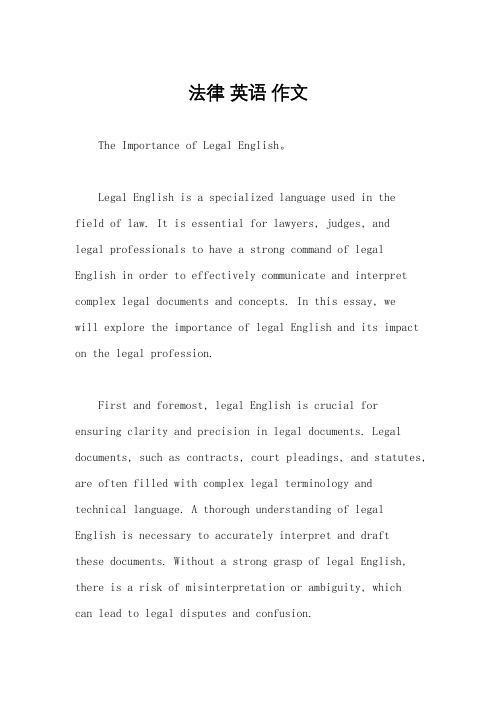
法律英语作文The Importance of Legal English。
Legal English is a specialized language used in thefield of law. It is essential for lawyers, judges, andlegal professionals to have a strong command of legal English in order to effectively communicate and interpret complex legal documents and concepts. In this essay, wewill explore the importance of legal English and its impact on the legal profession.First and foremost, legal English is crucial for ensuring clarity and precision in legal documents. Legal documents, such as contracts, court pleadings, and statutes, are often filled with complex legal terminology andtechnical language. A thorough understanding of legal English is necessary to accurately interpret and draftthese documents. Without a strong grasp of legal English, there is a risk of misinterpretation or ambiguity, whichcan lead to legal disputes and confusion.Furthermore, legal English is essential for effective communication in the legal profession. Lawyers and judges must be able to articulate their arguments and decisions clearly and persuasively. Legal English provides a framework for expressing legal concepts and reasoning in a precise and coherent manner. Additionally, legal English is used in court proceedings, where it is important for all parties involved to understand and communicate effectively in order to ensure a fair and just legal process.Moreover, legal English is essential for international legal practice. In an increasingly globalized world, lawyers and legal professionals often work across borders and collaborate with colleagues and clients from different countries. Legal English serves as a common language for legal professionals to communicate and conduct business on an international scale. It is also the language of choice for international legal agreements and treaties, making it crucial for lawyers to have a strong command of legal English in order to navigate the complexities of international law.In addition, legal English plays a critical role in legal research and scholarship. Legal scholars and researchers rely on legal English to access and analyze legal materials, such as case law, statutes, and legal journals. A solid understanding of legal English is necessary for conducting thorough and accurate legal research, which is essential for the development of legal theory and the advancement of the legal profession.In conclusion, legal English is an indispensable tool for the legal profession. It is essential for ensuring clarity and precision in legal documents, facilitating effective communication, and navigating the complexities of international law. As such, legal professionals must prioritize the development and mastery of legal English in order to excel in their careers and uphold the principles of justice and fairness in the legal system.。
深入了解法律英语作文
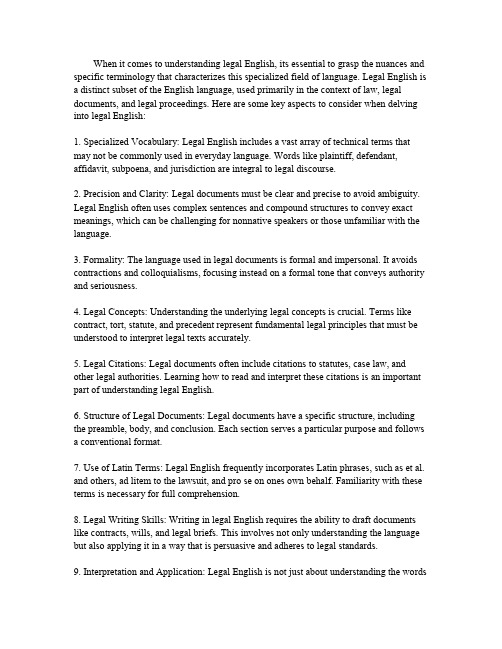
When it comes to understanding legal English, its essential to grasp the nuances and specific terminology that characterizes this specialized field of language. Legal English is a distinct subset of the English language, used primarily in the context of law, legal documents, and legal proceedings. Here are some key aspects to consider when delving into legal English:1. Specialized Vocabulary: Legal English includes a vast array of technical terms that may not be commonly used in everyday language. Words like plaintiff, defendant, affidavit, subpoena, and jurisdiction are integral to legal discourse.2. Precision and Clarity: Legal documents must be clear and precise to avoid ambiguity. Legal English often uses complex sentences and compound structures to convey exact meanings, which can be challenging for nonnative speakers or those unfamiliar with the language.3. Formality: The language used in legal documents is formal and impersonal. It avoids contractions and colloquialisms, focusing instead on a formal tone that conveys authority and seriousness.4. Legal Concepts: Understanding the underlying legal concepts is crucial. Terms like contract, tort, statute, and precedent represent fundamental legal principles that must be understood to interpret legal texts accurately.5. Legal Citations: Legal documents often include citations to statutes, case law, and other legal authorities. Learning how to read and interpret these citations is an important part of understanding legal English.6. Structure of Legal Documents: Legal documents have a specific structure, including the preamble, body, and conclusion. Each section serves a particular purpose and followsa conventional format.7. Use of Latin Terms: Legal English frequently incorporates Latin phrases, such as et al. and others, ad litem to the lawsuit, and pro se on ones own behalf. Familiarity with these terms is necessary for full comprehension.8. Legal Writing Skills: Writing in legal English requires the ability to draft documents like contracts, wills, and legal briefs. This involves not only understanding the language but also applying it in a way that is persuasive and adheres to legal standards.9. Interpretation and Application: Legal English is not just about understanding the wordsbut also about interpreting how they apply to specific situations and how they can be used to support or refute legal arguments.10. Continual Learning: The field of law is dynamic, with new legislation, cases, and interpretations emerging regularly. Staying current with legal developments is crucial for maintaining proficiency in legal English.11. Cultural Context: Legal English is influenced by the cultural and historical context of the common law system, which originated in England and has influenced many other legal systems around the world.12. Professional Development: For those seeking to specialize in legal English, professional development opportunities such as continuing education courses, workshops, and certifications can enhance understanding and proficiency.By focusing on these aspects, one can develop a deeper understanding of legal English and its application in the legal profession. This knowledge is invaluable for legal professionals, law students, and anyone involved in the interpretation or drafting of legal documents.。
法律文书,英语

法律文书,英语篇一:英文法律文书写作选词、用词英文法律文书写作选词、用词相同概念,相同用词应保证使用同一单词表述同一概念,避免使用不同的单词表述同一概念。
如在叙述某一辆轿车时,不要既用“thecar”,又用“thevehicle”来表述,否则会引起不必要的误解,例如:Eventhoughthedefendantcommentedthatwhileinprobationhehadabettedtw ominorsinpettylarceny,thisadmissionofillegalityisnotrelevanttothepresentc ase.本句缺陷在于“commented”与“admission”实际表述有些微差别,应将“commented”改为“admitted”。
[参考译文]即便被告承认在缓刑期间他曾教唆两名未成年人盗窃,但对该不法行为的承认与目前案件无关。
顺手牵羊叫shoplifting,抢劫是robbery,武装抢劫armedrobbery,强奸是rape,偷窃的小case是pettytheft,大case是larceny,更大案件grandlarceny,半夜闯空门则是burglary.走私毒品drugtrafficking,重伤害seriousassault,殴打assaultandbattery,纵火arson.像这些字都常在警匪片中出现。
律师的不同称谓一般来说,attorney指某一特定案件中代理一方应诉的律师。
[例句1]attorneySchwartzmovedforanewtrial.施瓦兹律师请求法院再审此案。
[例句2]Theattorneyforthedefenseobjectedtothequestion.被告律师反对这个问题。
lawyer是社会对律师的泛称。
[例句]Severalhundredlawyersattendedlastyear’saBaconvention.几百名律师参加了去年全美律师协会的会议。
法律文件的近义和同义词翻译

摘要:本⽂就法律⽂件⽤词精确这⼀特点,探讨中译英这类⽂件时经常遇到的近义和同义词问题,⽤实例印证,指出如何理解这些词,并根据法律⽤语要求传意精确的特点,如何选⽤译⽂的词语,以保证译⼊语与原语具有对等的法律含意和功能。
关键词:近义和同义词;法律⽂件;译⼊语;原语 The Translation of Words of Similar Meanings and Synonyms in Legal Documents Abstract: This article discusses the importance of the diction of English words of similar meanings and synonyms in the translation of legal documents from Chinese into English, and, by analyzing a sampling of translated legal clauses, tries to point out that correct English wording is essential to the total transmission of their meaning in relation to their legal functions in both source and translated languages. Key Words: words of similar meanings and synonyms, legal documents, translated language, source language 随着我国⼊世,法律⽂件翻译的研究已成为翻译⼯作者的⼀项重要任务。
我们不仅要把国际的法律⽂本译成中⽂,使我们能了解熟悉国际法律;我们还要把我国的涉外法规译成英⽂,使世界了解中国。
法律英语读后感
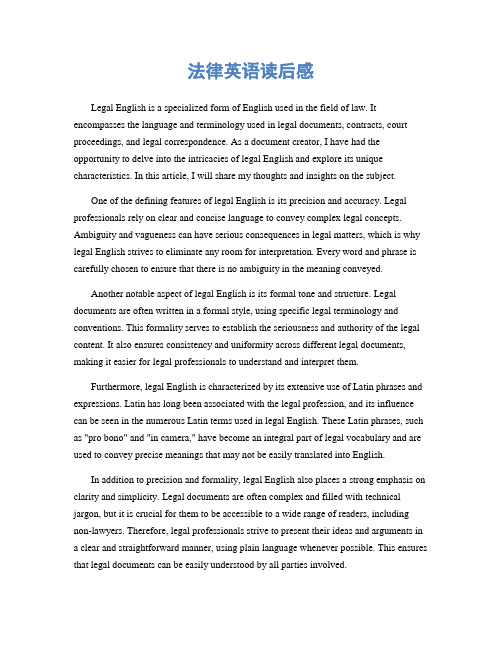
法律英语读后感Legal English is a specialized form of English used in the field of law. It encompasses the language and terminology used in legal documents, contracts, court proceedings, and legal correspondence. As a document creator, I have had the opportunity to delve into the intricacies of legal English and explore its unique characteristics. In this article, I will share my thoughts and insights on the subject.One of the defining features of legal English is its precision and accuracy. Legal professionals rely on clear and concise language to convey complex legal concepts. Ambiguity and vagueness can have serious consequences in legal matters, which is why legal English strives to eliminate any room for interpretation. Every word and phrase is carefully chosen to ensure that there is no ambiguity in the meaning conveyed.Another notable aspect of legal English is its formal tone and structure. Legal documents are often written in a formal style, using specific legal terminology and conventions. This formality serves to establish the seriousness and authority of the legal content. It also ensures consistency and uniformity across different legal documents, making it easier for legal professionals to understand and interpret them.Furthermore, legal English is characterized by its extensive use of Latin phrases and expressions. Latin has long been associated with the legal profession, and its influence can be seen in the numerous Latin terms used in legal English. These Latin phrases, such as "pro bono" and "in camera," have become an integral part of legal vocabulary and are used to convey precise meanings that may not be easily translated into English.In addition to precision and formality, legal English also places a strong emphasis on clarity and simplicity. Legal documents are often complex and filled with technical jargon, but it is crucial for them to be accessible to a wide range of readers, including non-lawyers. Therefore, legal professionals strive to present their ideas and arguments in a clear and straightforward manner, using plain language whenever possible. This ensures that legal documents can be easily understood by all parties involved.Moreover, legal English is not limited to written communication. It also extends to oral communication in courtrooms and legal proceedings. Lawyers and judges must be able to articulate their arguments and judgments clearly and persuasively. Effective communication skills are crucial in the legal field, as they can significantly impact the outcome of a case. Therefore, legal professionals must master the art of speaking in legal English, using appropriate language and rhetoric to convey their message effectively.In conclusion, legal English is a highly specialized form of language that plays a crucial role in the field of law. Its precision, formality, clarity, and simplicity are essential for the effective communication of legal concepts and ideas. As a document creator, I have come to appreciate the unique characteristics of legal English and the importance of using it accurately and appropriately. By mastering legal English, legal professionals can ensure that their documents and arguments are clear, concise, and legally sound.。
法律英语单词
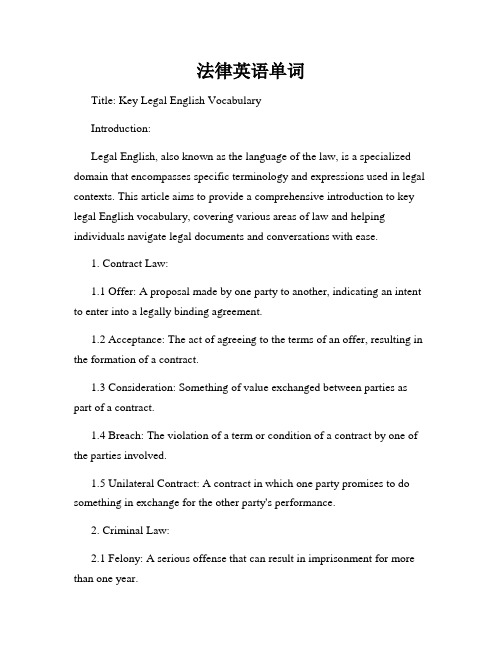
法律英语单词Title: Key Legal English VocabularyIntroduction:Legal English, also known as the language of the law, is a specialized domain that encompasses specific terminology and expressions used in legal contexts. This article aims to provide a comprehensive introduction to key legal English vocabulary, covering various areas of law and helping individuals navigate legal documents and conversations with ease.1. Contract Law:1.1 Offer: A proposal made by one party to another, indicating an intent to enter into a legally binding agreement.1.2 Acceptance: The act of agreeing to the terms of an offer, resulting in the formation of a contract.1.3 Consideration: Something of value exchanged between parties as part of a contract.1.4 Breach: The violation of a term or condition of a contract by one of the parties involved.1.5 Unilateral Contract: A contract in which one party promises to do something in exchange for the other party's performance.2. Criminal Law:2.1 Felony: A serious offense that can result in imprisonment for more than one year.2.2 Misdemeanor: A less serious offense, typically punishable by finesor imprisonment for less than one year.2.3 Bail: A sum of money deposited as a guarantee for the temporary release of an accused person.2.4 Plea Bargain: An agreement between the prosecution and the defense, in which the accused pleads guilty to a lesser charge in exchange for a reduced sentence.2.5 Habeas Corpus: A legal action through which a person can seek relief from unlawful detention.3. Tort Law:3.1 Negligence: The failure to exercise a reasonable standard of care, resulting in harm or injury to another person.3.2 Duty of Care: The legal obligation to act in a manner that does not cause foreseeable harm to others.3.3 Damages: Monetary compensation awarded to the injured party in a lawsuit.3.4 Strict Liability: Holding a party liable for damages regardless of fault or intent.3.5 Defamation: The act of making false statements that harm someone's reputation.4. Intellectual Property Law:4.1 Patent: A government-granted exclusive right to invent and market an invention.4.2 Copyright: Legal protection granted to the creators of original works, such as literary, artistic, or musical creations.4.3 Trademark: A distinctive sign, symbol, or phrase used to identify and distinguish goods or services from others in the market.4.4 Infringement: The unauthorized use or reproduction of someone's intellectual property rights.4.5 Fair Use: A legal doctrine that allows limited use of copyrighted material without permission, primarily for educational or transformative purposes.5. International Law:5.1 Sovereignty: The exclusive right of a state to govern its territory and determine its internal and external affairs.5.2 Diplomacy: The practice of conducting negotiations between representatives of different countries.5.3 Treaties: Formal agreements between states that establish rights and obligations.5.4 Jurisdiction: The authority of a court or legal system to hear and decide upon a case.5.5 Human Rights: Fundamental rights and freedoms to which all individuals are entitled, irrespective of nationality or jurisdiction.Conclusion:Mastering key legal English vocabulary is essential for anyone involved in legal careers or dealing with legal matters. Understanding the language of the law enables individuals to comprehend legal documents, participate in legal discussions, and navigate legal systems both domestically and internationally. This article provides a foundation for strengthening legal English language skills, but further exploration and practice are encouraged to develop a comprehensive understanding of this specialized field.。
法律英语的魅力作文

法律英语的魅力作文The Charm of Legal English。
Legal English is a unique and fascinating language that plays a critical role in the legal profession. It is a language that is precise, formal, and often complex, and it is essential for anyone working in the field of law to have a strong command of legal English. The charm of legal English lies in its ability to convey complex ideas and concepts with clarity and precision, and its use of language to create persuasive and compelling arguments.One of the key features of legal English is its precision. Legal documents and contracts must be drafted with absolute precision to ensure that there is no ambiguity or room for misinterpretation. Legal English uses specific terminology and language that is designed to be clear and unambiguous, and it is this precision that allows legal professionals to communicate effectively and accurately.In addition to its precision, legal English is also a formal language that is used in a professional context. Legal documents and court proceedings require a formal and professional tone, and legal English is the language thatis used to convey this formality. This formality adds anair of authority and seriousness to legal documents and proceedings, and it is an essential aspect of the language that gives it its charm.Furthermore, legal English is often complex and can be difficult to understand for those who are not familiar with its terminology and structure. This complexity is a key aspect of the charm of legal English, as it requires a deep understanding of the language and its nuances in order to effectively navigate the legal profession. The complexity of legal English also adds an element of challenge and intrigue to the language, making it an engaging and rewarding language to study and master.Another aspect of the charm of legal English is its use of language to create persuasive and compelling arguments.Legal professionals use language to build their cases and persuade judges and juries, and legal English provides the tools and techniques to do so effectively. The use of language to create persuasive arguments is a key aspect of the charm of legal English, and it is this ability to use language to influence and persuade that makes legal English such a powerful and captivating language.In conclusion, legal English is a unique andfascinating language that plays a critical role in thelegal profession. Its precision, formality, complexity, and use of language to create persuasive arguments are all aspects of its charm, and it is these qualities that make legal English such a compelling and captivating language. For anyone working in the field of law, a strong command of legal English is essential, and mastering this language is a rewarding and worthwhile endeavor.。
- 1、下载文档前请自行甄别文档内容的完整性,平台不提供额外的编辑、内容补充、找答案等附加服务。
- 2、"仅部分预览"的文档,不可在线预览部分如存在完整性等问题,可反馈申请退款(可完整预览的文档不适用该条件!)。
- 3、如文档侵犯您的权益,请联系客服反馈,我们会尽快为您处理(人工客服工作时间:9:00-18:30)。
2. Graphological Features At the graphological level, the most striking feature is that the typing does not take the convenience of the reader into consideration, and which can be reflected in the following aspects: a) Rare use of punctuation marks. This is because the change or addition or omission of punctuations might change the meaning of the documents, and so it might as well do without them. When sometimes punctuation marks are used, the most frequently used ones are just the comma and the full stop, since the sentences used in legal documents are always statements. The second reason is that legal documents are not written for reading aloud, and therefore there is no need for pauses marked by punctuations.
Laws can be divided into two big branches: the private law and the public law. The private law is also called ‘civil law’ which determines a person’s legal rights and obligations in many kinds of activities that involve other people. The private law can be divided into six sub-branches. They are a) the contract and commercial law, b) the tort law, c) the property law, d) the inheritance law, e) the family law, and f) the corporation law.
The public law involves the government directly. It defines a person’s rights and obligations in relation to the government. The public law can also be divided into some sub-branches: a) the criminal law, b) the constitutional law, c) the administrative law, and d) the international law. Legal English always has some connection with the activities of the law courts in the statutes and regulations enacted by the government. It also has a close connection with the business of companies and the daily life of the people – contracts, insurance policies, hire-purchase agreements, house mortgages, leases of property, guarantees, etc., are all written in legal English.
b) Paragraphs are rather long, and some documents are written even in just one paragraph. Apart from these features, consistent use of initial capitalization is also noticeable in order to dignify the ‘owner’, or the ‘party’ or the important terms involved. 3. Lexical Features The most conspicuous lexical features of legal English may be explained as a) Archaic words, such as compound adverbs thereinafter (in the following part), hereinafter (in this document and after this point), hereof (of this, concerning this), hereby (by means; by means of this), thereof (of that) …
When a legal document is drawn up, the people connected will want to know exactly what rights and obligations are, and at the same time, they will be anxious to see that no other person can change it. If it comes to a dispute in a law court as to what the exact situation is, then everything has to be decided on the interpretation of the document. Hence, when documents are drawn up, extreme care has to be taken to be precise and unambiguous about the facts and the agreements concerning them, owing to the writers’ reliance on these established forms and their reluctance to change the well-tried modes of expressions.
The constant attempt to get these purposes has led to the development of a language of great complexity, therefore, the preference for old-fashioned language and the habit of clinging to words and expressions which were dropped out of use elsewhere. As a result, the writers of legal documents have to pay special attention to the precision of wording, and the avoidance of misunderstanding and ambiguity, and, accordingly, they often cite conventional formulas and use mode-expressions. At the same time, they should avoid personal feelings, opinions and judgments. Big and formal words, passive voice and long sentences are typical of legal English.
All in all, legal English concerns with the guarantee of people’s rights, the enforcement of their obligations, and the terms of punishment for the violation of the law and the evasion of their obligations. Legal English is most often presented in the written form, and it is probably the most archaic and formal of all the varieties of the language and it is certainly one of the most stylistically distinctive varieties of English. It is old fashioned because it draws upon a time-honored and well-tried tradition of usage which has evolved in the hands of lawyers, and which they know from experience does the job they want it to do – to state facts and agreements about them in an extremely precise way.
